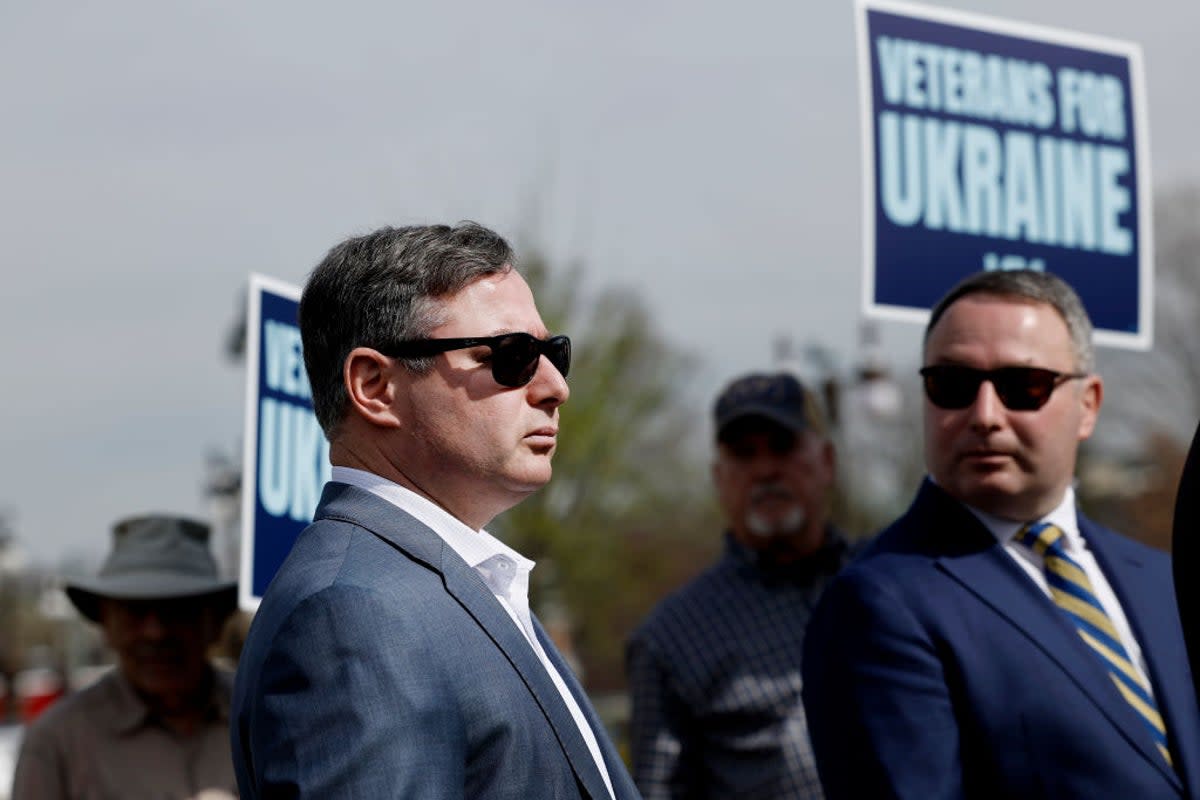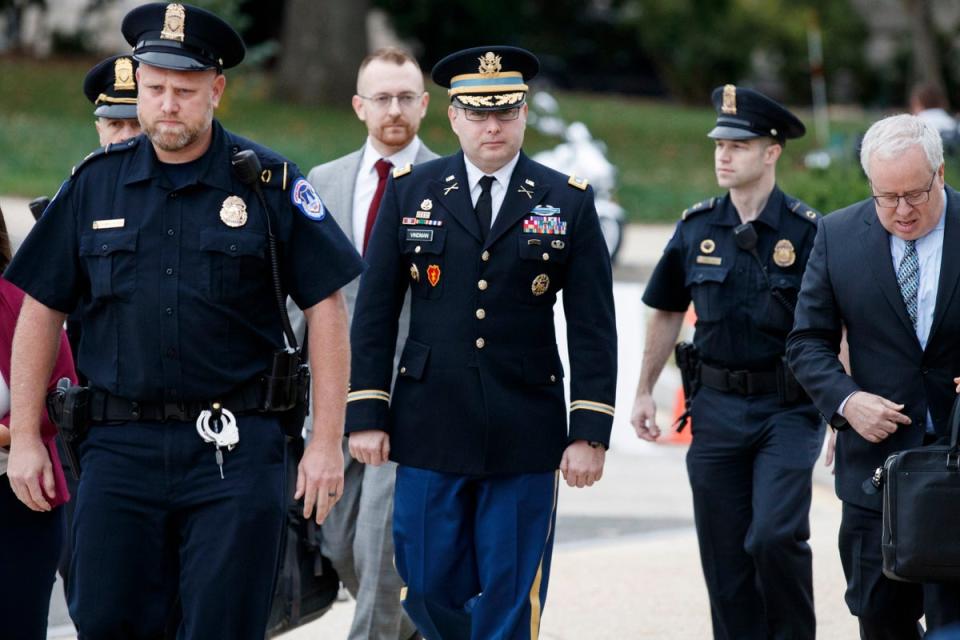Impeachment warrior or showboater? Trump’s shadow looms over a controversial Democratic primary

Get ready for the newest bipartisan political phenomenon to hit the House of Representatives: the impeachment warrior.
With Donald Trump’s first term — capped off by a bloody riot and siege of the Capitol aimed at overturning the last presidential election — in the mirror, Americans are looking ahead to an expected rematch between Trump and Joe Biden in November. And both parties are taking advantage of the unique dynamic that the possible return of a twice-impeached 34-times-convicted former president means for congressional races around the country.
The result? A group of candidates, Democrats and Republicans both, running for office with little to no political experience — but often backed by powerful national figures tied to the two sides of the first and second impeachments of Donald Trump in the House of Representatives.
In May, one of those candidates faced the music in Maryland. Harry Dunn, a former officer with US Capitol Police present on January 6, charged into the primary in Maryland’s third congressional district backed by national Democrats including Adam Schiff, the lead impeachment manager for Donald Trump’s first Senate trial. He lost, coming around 10 points behind state Senator Sarah Elfreth, who was backed by a surge of money from the American Israel Public Affairs Committee (AIPAC).
During the campaign, Dunn faced attacks for not living in the district and having no ties to state political movements or organizations. His defeat came despite being called a “real-life superhero” by one congresswoman and having been the only candidate in the race to score multiple interviews on cable news to promote his candidacy — or any cable slots, for that matter.
On Tuesday, in Virginia’s seventh congressional district, voters will get another crack at one of the Democrats’ “impeachment warriors”.
The congressional seat representing parts of Stafford County and the I-95 corridor is up for grabs this year; Abigail Spanberger, who is running for governor, is retiring. That’s kicked off two crowded primaries for the seat, one of Virginia’s purplest, set to come to a head on Tuesday. And as The Independent learned, candidates in both parties are talking about one man: Eugene Vindman.
If his last name sounds familiar, it’s because Vindman, now retired from the Army, was at the center of the first impeachment inquest filed against Donald Trump in 2020. At the time, Yevgeny “Eugene” Vindman and his brother Alexander, identical twins, reported a phone call between then-President Trump and Volodymyr Zelensky, president Ukraine, which triggered a months-long impeachment saga. They then claimed to have been the targets of political retribution, which Eugene has said included a delay in his promotion to colonel.
But it’s that very dispute that has made Vindman, the Washington Post-endorsed candidate for the seventh district, a target for ire on both sides of the aisle. As he has run for Congress, Vindman has leaned heavily on his reputation as a central figure in the first impeachment of President Trump.
“Trump and MAGA Republicans will do everything they can to defeat me,” he declared in an ad last November, a full year before the general election. “Beating MAGA won’t be cheap, so I’d be grateful for your help.”
But at the time, he wasn’t facing MAGA Republicans; he was facing a crowd of his fellow Democrats for the party’s nomination. And some of them were not happy at the announcement that a well-known but politically untested candidate was jumping into the race.
“I’m sorry — who is this? I’ve never seen this person in our area. At. All,” tweeted one state delegate, Joshua Cole, whose statehouse district overlaps with the seventh congressional district.
Clifford Hainzer, one of the other Democrats running for the VA-07 seat, explained it more delicately: “All of the elected officials, or former elected officials, in principle, they’ve all been out doing this for years. I don’t just mean doing politics. They’ve been fighting for the Democratic [Party] cause, out there knocking on the doors and going to the events.”
“So I think you can see why these questions can come up for particularly those of us who have been very active in Democratic causes for years,” he said. “It’s not hard to see why there may be some saying, ‘Hey, wait a second, we’ve been out here doing it. Why is the Post paying so much attention to the candidates who’ve raised the most money instead of the candidates who have been out doing the hard work?’”

As the primary has drawn closer, the scrutiny has grown as well. After months of claiming in campaign literature that Donald Trump “forced [him] to retire” and that MAGA Republicans had “ended [his] 25-year military career” (despite the fact that he retired in 2022, under President Joe Biden), Vindman is now facing an accusation from one of his long-shot fellow Democratic candidates for the seat, Carl Bedell, of disrespecting the uniform. Bedell, like Vindman, is a veteran and served as a military intelligence officer.
An internal poll released by the Vindman campaign in the final days of the primary indicated that he is the clear frontrunner for the Democratic nomination. Bedell’s support did not register on the survey, though that didn’t stop him from swinging at his opponent in no uncertain terms.
Vindman’s “characterization of how his career ended is deceptive at best. It jeopardizes this election for the Democratic Party,” Bedell told The Independent.
He also took issue with how Vindman has characterized his rank in campaign literature, which has often referred to him as a “colonel (ret.)”, or a retired colonel. While it’s true that when Vindman retired in 2022 he was at the rank of colonel, having been promoted a year prior, he had not served the required three years in rank necessary under Army protocols to retain that rank upon retirement; as a result, he was bumped back to lieutenant colonel for his retirement rank.
“His decision to continue to wear a Colonel’s insignia and refer to himself as a retired Colonel is disrespectful to all those that honorably served – especially those whose service entitled them to that rank in retirement, and wrong according to Army regulations,” Bedell said.
The Independent reached out to the Vindman campaign with a list of detailed questions regarding why he has made the above claims about his rank, and extended the opportunity for a response to the criticism he has faced both on the issue of his military service and his general apparent lack of political connections to the seventh congressional district.
A law firm representing the Vindman campaign then contacted The Independent threatening litigation. The letter insisted that Vindman “is a Colonel and correctly identifies himself as such”, and that “Pursuant to Army Custom and Regulation 25-50, the proper mode to address Colonels and Lieutenant Colonels is Colonel.” The letter also claimed that reporting Bedell’s statement would be defamatory.
The attorney for Vindman further stated that he “does not dispute that he retired at the grade of O5 [Lieutenant Colonel]. However, his pay grade at retirement has no impact on either pay or entitlements and on whether he is in fact a retired Colonel.”
But experts familiar with the promotions and retirement processes disagree. Carl Chandler, writing in 2022 in his capacity as adviser to the Mason Veterans and Servicemembers Legal Clinic at George Mason law school, explained it this way: “[I]f you are an officer applying to retire above the rank of Captain, you need to have at least three years of service from the date you pinned on your rank to be eligible to retire at that rank.” (Lieutenant colonel and colonel are both above the rank of captain in the Army).
The actual US Code states it fairly clearly as well: “In order to be eligible for voluntary retirement under any provision of this title in a grade above the grade of captain in the Army, Air Force, or Marine Corps, lieutenant in the Navy, or the equivalent grade in the Space Force, a commissioned officer of the Army, Navy, Air Force, Marine Corps, or Space Force must have served on active duty in that grade for a period of not less than three years.”
Vindman is well aware of this. He applied in 2022 for a waiver under the Biden administration to retire at the rank of colonel. At the time, a group called Lawyers Defending American Democracy wrote an open letter stating clearly that Vindman would retire at the rank of lieutenant colonel without that waiver.
He “seeks the pure honor of retiring as a Colonel, which, by statute, would take President Biden’s waiver of the requirement that Eugene have served three years in rank,” wrote the group.
Vindman’s request was denied. As Newsweek reported in 2022: Vindman “will retire as a lieutenant colonel, having not served the minimum requirement of three years to retire under his current rank”. The publication reported that the Army declined to send Vindman’s request to Biden’s desk.

“Eugene and I have had this discussion,” Stafford County Democratic Party chair Howard Rudat told The Independent.
Rudat, who took the position that Vindman’s career was irreparably damaged by Trump’s attempts at vengeance or political interference, dismissed the criticism leveled by Bedell. He argued that the discrepancies were not a liability for Vindman in November, and said that Vindman had “paid the ultimate career price” for standing up to the ex-president.
“Only because of the personally vindictive actions of President Trump at the time did both he and his brother’s career’s short circuit, and he was not allowed to have the full three years [in order to retire as a colonel]” Rudat argued.
That explanation has not satisfied Bedell or some of the Republicans who are preparing for a general election campaign this summer and fall.
“I worked on the Joint [Chiefs] staff, for the Chairman of the Joint Chiefs in the Intel area,” Republican candidate Jonathon Myers, another veteran, told The Independent in an interview in Fredericksburg.
Myers offered a frank take on Vindman, whom he admitted that he and other Republicans in the district were already treating like the presumptive nominee for the Democrats. Vindman, he argued, was “very politically minded” and supposedly made his decisions while in uniform with a future career in mind.
“He’s not from here. He moved here, four years ago, he moved into Virginia, in my opinion, to try to run for Congress.”

“He saw [the Ukraine call] as an opportunity and an opportunity to self-promote, and that was the general consensus amongst the military officers that had served up there,” Myers claimed. He also rejected Vindman’s claim that Trump had tainted the promotions process, which he called “a very controlled process”.
Myers said Vindman’s portrayal of his rank in campaign literature had “raised [his] eyebrows”.
“I actually got confused for a minute and I said, ‘Did something change?’ Because I thought he retired as [a lieutenant colonel]. And then, you know, I guess he didn’t.”
One other Democratic candidate running in the district against Vindman characterized the race as beset by the outside influences of national Democrats who were ignoring the concerns and voices from the seventh district in favor of a candidate with national prominence and better fundraising opportunities.
“We’ve, again, had good local candidates and at a certain point the party will intervene and say, ‘No, we don’t like him. He’s not raising enough money,’” they told The Independent on condition of anonymity to speak about the national Democratic Party structure.
The candidate then described the reaction to the candidate given preferential treatment in these cases: “Wait a second. Nobody ever heard of this person politically before. They’ve never been politically involved. What are you doing?” They characterized Vindman and others like him as running on “the hopes that celebrity and name recognition and the fundraising that [those] can sometimes bring are a substitute for having the message that people want to hear.”
If Vindman wins the crowded Democratic contest on June 18, it’s not like he will face any kind of real opposition from within his party as he tries to keep the seat blue in November. All the Democrats who spoke to The Independent — even those with harsh criticisms — said that they would support the now-retired lieutenant colonel enthusiastically were he to be the candidate nominated to run in the general election.
But the broader question remains for both parties around whether this trend of untested political celebrity is one their donors and infrastructure want to embrace. It’s one that could have real consequences for both parties, which are flirting with these candidates openly this year in the first post-January 6 presidential election cycle.
Not every case is the same. Dunn and Vindman, while sharing similarities, come from different backgrounds and far different sectors of the government. Perhaps that’s for the best: Dunn, speaking in an MSNBC interview about his defeat earlier this month, lamented that “when I ran my own campaign, I had to come up with policies for, you know, inflation, my thoughts about the border, and everything like that”.
Republicans currently have a majority of five votes in the lower chamber, which has 435 seats. The path to either party winning the House in November runs straight through districts like the 7th. And every race — no matter how small the district — feels the weight of Donald Trump, and his own obsession with celebrity, on its back.
